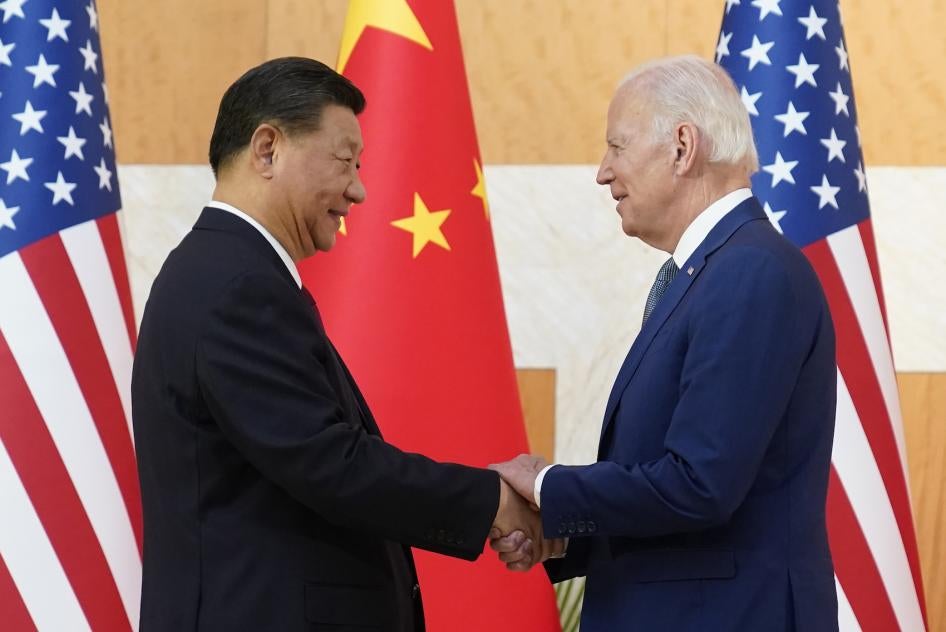President Joe Biden will meet Chinese President Xi Jinping in San Francisco on the sidelines of the Asia-Pacific Economic Cooperation meeting on November 15. The Biden administration in 2022 said that human rights are part of its “alignment” strategy to “join with countries and people to raise [human rights] issues and call for change – not to stand against China, but to stand up for peace, security, and human dignity.”
Biden’s meeting with Xi is an opportunity to stand by that commitment and to pointedly raise human rights concerns in China.
Of course, Biden comes into that conversation with Xi standing on a mixed record for pursuing justice and accountability for human rights violations around the world. In recent weeks the United States has been widely criticized for supporting Israeli actions in Gaza without conditions despite increasing abuses.
At the same time, the U.S. has brought the full weight of its influence to hold Russia accountable for violations of international law in Ukraine — including unprecedented sanctions, funding for evidence collection, and even supporting the International Criminal Court.
As a messenger on human rights, President Biden is woefully inconsistent. President Xi, however, is consistently brutal. Many governments avoid raising human rights concerns directly with China’s leaders, fearing economic and diplomatic retaliation. The United States is not one of them, making President Biden’s conversation about human rights with Xi essential.
Xi’s Deepening Repression
Under Xi Jinping’s rule, the Chinese government has committed widespread arbitrary detention, cultural persecution, and forced labor against Uyghurs and other Turkic Muslims. These amount to crimes against humanity, findings echoed by the United Nations in an August 2022 report. China has also severely curtailed culture and religion in Tibet, and extinguished freedom of expression.
A million Hong Kongers marched for months in 2019 amid growing police violence in an effort to safeguard their rights in line with Hong Kong’s Basic Law. Those freedoms were consigned to history with the passage of a draconian national security law in June 2020 that criminalizes peaceful acts of protest and dissent.
China’s repression does not stop at its borders, with the government undermining UN human rights mechanisms and extending its long arm of repression into other countries, seeking to silence criticism of the Chinese government internationally.
The failure of countries to push back against Chinese government abuses has emboldened Beijing to escalate and export its repression. All governments should recognize that in the long run, the world’s interests will be best served if the Chinese government respects human rights and the rule of law.
Biden should outline specific actions the U.S. will take if the Chinese government does not take steps to reverse its deepening repression across the country. He should press Xi to release human rights defenders arbitrarily held in China. The list is long but he should mention by name the anti-corruption activist Xu Zhiyong, the human rights defender Guo Feixiong, and the Uyghur scholar Ilham Tohti, among others facing long imprisonment, in poor health, or subjected to mistreatment, He should be clear that Beijing’s dismantling of Hong Kong’s freedoms has hurt bilateral relations and that the National Security Law should be scrapped.
At the UN General Assembly in New York in September, more than 50 countries including the U.S. issued a joint declaration condemning the Chinese government’s crimes against humanity with respect to the Uyghurs and other Turkic communities in Xinjiang, and calling on Beijing to end its systematic human rights abuses there.
A genuinely coordinated international initiative should involve the U.S. and other governments establishing an independent international investigative mechanism through the UN Human Rights Council, expanding targeted sanctions against Chinese officials implicated in serious violations, and where possible, opening national investigations and prosecutions for those responsible for torture and other serious abuses.
Until there is a UN mechanism, governments should improve efforts to document the numbers and identities of those who have been forcibly disappeared into Chinese prisons and detention centers, and press for their release and an accounting of their whereabouts.
Eyes on Biden
One year ago, after a lone man, Peng Lifa, protested on a Beijing bridge against the Chinese government’s repressive COVID-19 lockdowns and authoritarian rule, thousands of young people across cities in China took extraordinary risks to demonstrate their desire for change. In peaceful protests they held up blank pieces of white paper, a powerful symbol of what cannot be said in China.
Protesting in China is incredibly brave given the heavy-handed tactics the Communist Party uses to censor, surveil, and subjugate the population into silence. But as quickly as the Chinese government snuffed out the protests, disappearing Peng and detaining some of the protesters, it gave a glimmer of hope to those who participated that they weren’t alone.
Biden would be a more credible messenger on human rights if his administration walks back its support for rights-abusing regimes in Israel, Saudi Arabia, and elsewhere. But that inconsistency doesn’t mean Biden should abandon human rights altogether.
When Biden meets Xi, he should show his support for people in China, Xinjiang, Tibet, and Hong Kong — and show a willingness to hold the Chinese government accountable for rights abuses at home and abroad.









